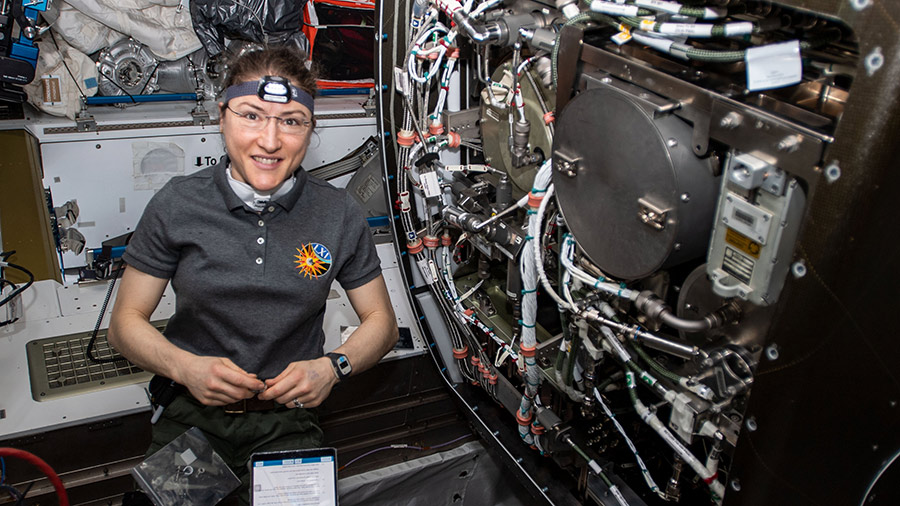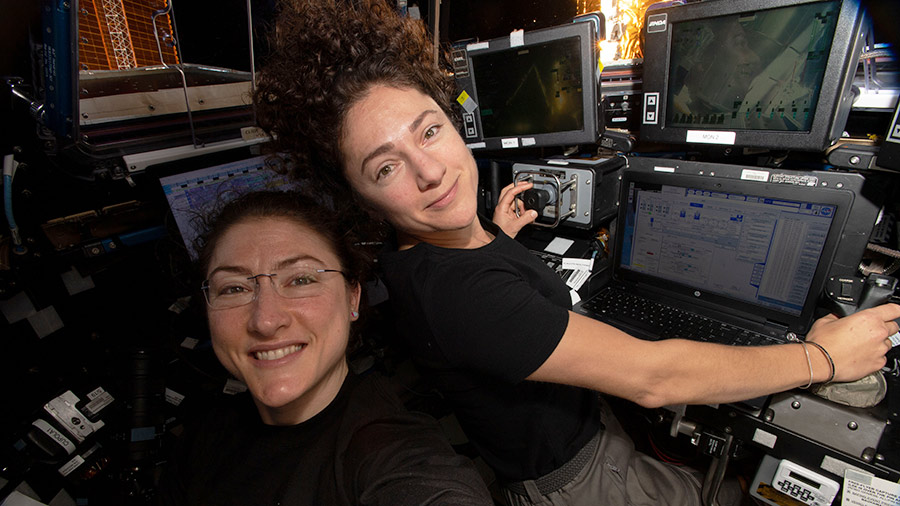Building the Rover of the Future
A student from Sinte Gleska University works to build a model rover for a NASA Community College Aerospace Scholars.
NASA Image of the Day
Powered by WPeMatico
A student from Sinte Gleska University works to build a model rover for a NASA Community College Aerospace Scholars.
NASA Image of the Day
Powered by WPeMatico

The Expedition 61 crew serviced a variety of science and life support hardware today aboard the International Space Station. U.S. spacesuits are also being readied for a series upcoming cosmic repair spacewalks.
NASA astronaut Andrew Morgan and Commander Luca Parmitano of ESA (European Space Agency) will enter the vacuum of space on Nov. 15 to repair the Alpha Magnetic Spectrometer (AMS). Christina Koch of NASA is preparing the U.S. spacesuits and cleaning the components ahead of at least four planned AMS repair spacewalks. The spacewalking duo will perform the complex repairs necessary to upgrade the dark matter and antimatter detector’s thermal control system.
In the meantime, Morgan focused on science hardware and set up experiment gear containing materials for exposure in the harsh environment of space. He installed three experiment carriers inside the Kibo laboratory module’s airlock before depressurizing it. Japan’s robotic arm will grapple the carriers and deploy them outside Kibo. The research is testing how cosmic radiation, extreme temperatures and other space phenomena affect a variety of samples.
Science freezers that preserve critical research samples for analysis had their systems checked today by NASA Flight Engineer Jessica Meir. She also replaced components on a 3-D bioprinter, also called the BioFabrication Facility. The device is testing the manufacturing of complex human organ tissue shapes in space.
Cosmonaut Alexander Skvortsov is packing trash and obsolete gear inside the Progress 73 (73P) resupply ship. The 73P will undock from the Pirs docking compartment on Nov. 29 for a fiery but safe disposal over the southern Pacific.
Mark Garcia
Powered by WPeMatico
Two astronauts will venture outside the International Space Station for a series of complex spacewalks this month and next to repair the Alpha Magnetic Spectrometer (AMS), a cosmic ray detector.
NASA Breaking News
Powered by WPeMatico
This week in 1967, the Apollo 4 mission launched from NASA’s Kennedy Space Center.
NASA Image of the Day
Powered by WPeMatico

The Expedition 61 crew explored how microgravity is affecting a variety of biological processes in humans and microbes today. Two astronauts are also gearing up for tentatively planned spacewalks to repair a cosmic particle detector.
Aging on Earth and living in space impacts an individual’s blood pressure with some astronauts experiencing stiffened arteries after returning to the ground. NASA Flight Engineer Jessica Meir investigated the phenomena today attaching electrodes to her leg and scanning her veins with an ultrasound device. Doctors on Earth will review the downloaded data with results informing potential therapies for Earth-bound and space-caused ailments.
Microbes live everywhere including inside the International Space Station. NASA astronaut Christina Koch is sequencing DNA collected from microbial samples swabbed from inside the orbiting lab. Observations may provide insights into the genetic adaptations taking place to survive in weightlessness.
Commander Luca Parmitano and Flight Engineer Andrew Morgan are studying the complex spacewalk procedures required to repair the Alpha Magnetic Spectrometer (AMS). At least four spacewalks are scheduled, the first of which will be on Friday, Nov. 15. The dates for the other spacewalks are under review and will be scheduled in the near future.
The duo have begun unpacking the AMS tools and hardware delivered aboard the Cygnus resupply ship on Monday. The eight-and-a-half year-old device, which searches for signs of dark matter and antimatter, will have its thermal control system upgraded over a series of soon-to-be scheduled spacewalks.
Cosmonauts Alexander Skvortsov and Oleg Skripochka explored their set of human research in the station’s Russian segment today. The duo researched the space-caused loss of bone mass and the interactions between international crews and mission controllers during long-duration missions.
Mark Garcia
Powered by WPeMatico